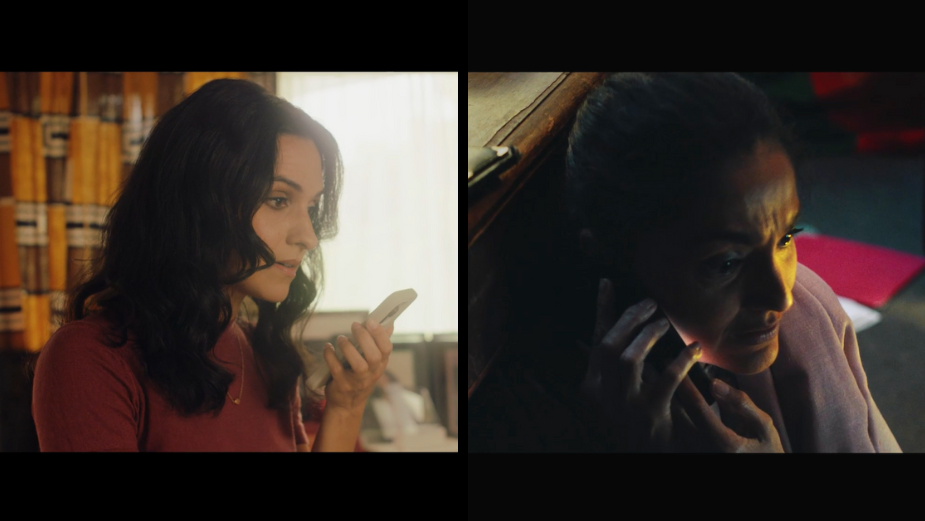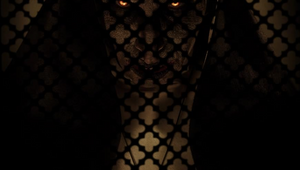
Before Dawn, Kabul Time: Behind Tara Motamedi’s Gripping Film on Human Rights for Afghan Women

Inspired by the belief that talent is universal, but opportunity is not, Indeed’s Rising Voices was created to uncover, invest in and share stories created by BIPOC filmmakers.
Indeed’s goal for this initiative is to expand the creation of sustainable job opportunities for talented underrepresented creatives and through their partnership with Lena Waithe and Hillman Grad Productions, they have been able to accomplish that with over 1000 jobs created through the program since its inception so far.
“Indeed’s Rising Voices not only levels the playing field for BIPOC creators in Hollywood by creating opportunities for individuals to be seen, heard and represented, but also empowers the next generation of storytellers, providing access to funding, on-site skill, career development and mentorship,” Lena says. “Our continued mission at Hillman Grad Productions is to ensure that program mentees are truly set up for success as they continue to grow within their individual careers.”
CEO of Indeed, Chris Hyams says: “Indeed’s mission is to help people get jobs. Season one of Rising Voices proved our belief that talent is universal but opportunity is not. With season two, we are thrilled to bring 10 brilliant new voices to the story of the power of jobs to change lives.”
Indeed’s SVP of environmental, social and governance LeFawn Davis adds: “We are excited about the selection of 10 more BIPOC filmmakers who will have the opportunity to share their stories through Indeed’s Rising Voices season two. Partnering with Hillman Grad, Ventureland, 271, and Tribeca to showcase their talent will give these filmmakers a leg up in a very competitive industry where opportunities like these are hard to come by.”
One such selected filmmaker is Tara Motamedi, whose short film ‘Before Dawn, Kabul Time’ was screened before Jordan Peele’s ‘Nope’, in multiple theatres across the US from Los Angeles and New York, to Chicago, Wisconsin, Missouri, Nebraska and Minnesota.
Here in this interview, LBB’s Sunna Coleman speaks with director Tara Motamedi, along with the team at Therapy Studios including EP Margaret Ward, editor Shannon Albrink, colourist Omar Inguanzo, sound designer Dillon Cahill, and re-recording mixer Cameron McMichael to find out how this stunning work came together.
LBB> First up Tara, congratulations on being selected for Rising Voices season two! How did it feel to be chosen and what does this opportunity mean to you?
Tara, director> It felt wonderful to be believed in and to be given an opportunity to create a film with full funding, support and mentorship from one of my favourite directors, Melina Matsoukas. It also felt empowering to play a small role in making our industry more diverse and equitable which is what Rising Voices is about.
Indeed, Hillman Grad and Ventureland are companies that use their power and influence to empower others and, in effect, change the face of an industry. I feel lucky to have been one of ten directors selected this year to partake in that mission and I look forward to seeing the careers of ten more filmmakers change for the better next year.
LBB> Tell us about your inspiration and concept for your film, ‘Before Dawn, Kabul Time’.
Tara, director> The inspiration behind my film is Afghan women who have been stripped of their basic human rights under the Taliban rule - and the world seems to have forgotten and moved on. The story of our film follows an Afghan prosecutor who tries to run away from the Taliban and flee Afghanistan before the Americans fully evacuate Kabul.
I’d like for my audience to know that what they’re watching is a real story, and many Afghans lived through that trauma. Before the Taliban took over Afghanistan in August of 2021, those same women were journalists, lawyers, artists, flight attendants and filmmakers… but now, they have either taken refuge elsewhere and/or are hiding in the shadow of the Taliban. As Americans, as free people, we need to help Afghans and speak for them!
LBB> What was your vision for the overall storyline, feel and look of the film?
Tara, director> The overall vision was very much focused on showing contrast between the two worlds of my main characters. We had an Afghan woman running for her life due to her line of work, and an American journalist who was going to use her job to help evacuate the woman. The world of my Afghan prosecutor Noor, played by Wida Karim, was set in the chaotic streets of Kabul and in her law office, while the world of my American journalist Ava, played by Neagheen Homaifar, was a peaceful California home with birds chirping outside.
We needed the audience to fully experience the opposing worlds. California had a warm palette with bright colours to make the audience feel warm and cosy. While Afghanistan had a bruised colour palette to subconsciously make us feel uncomfortable. This was a conversation that I had with each department-head early on. So my cinematographer Daniel Rink and our art team worked closely together to choose the right visuals that portrayed the feelings we were after.
The same concept was also applied in post production. Our colourist, Omar Inguanzo at Therapy Studios, created a perfect contrast between the two looks. For Afghanistan we went with a more contrasty, gritty and cooler feel, and California was bright, saturated and warm.
Omar, colourist> We really wanted to embody the tension of the story and create a world on screen to make the movie-goer feel as trapped as the main character.
LBB> And Therapy, tell us how you first came to work on Tara’s film for Rising Stars?
Margaret, EP> Tara and I have been friends since our days in film school and have always stayed in touch over the years. When we ran into each other at a friend's premiere, she started telling me about this short film she had written that was very near to her heart as it was based on true events that she personally experienced. It immediately caught my attention and I expressed interest in helping her in any way we could. Shortly after that, she found out that she had been accepted into the Rising Voices programme, and she brought us into the fold to handle all of her post production.
LBB> What were your initial creative ideas and thoughts?
Shannon, editor> When Margaret approached me, I saw that the schedule for the project would be quite intense, but after reading the script I knew that I had to work on it no matter what it took. What struck me initially about the script was the overwhelming sense of fear and loss of control, a feeling that anyone in this day and age can relate to with the seemingly devolving world before us.
To this day, women are still treated as second class citizens in Afghanistan, and they are still being tortured under the Taliban regime. With our ever-changing news cycles and attention spans, most Americans have forgotten that Afghan citizens are under Taliban rule, and Afghan women are trapped inside their houses - unable to have jobs, unable to go to school, unable to make their own choices in life.
Going back to the first page of the script, I was horrified to find “based on true events” under the title next to Tara Motemedi’s name. I really wanted to elevate Tara’s voice and be a small part in telling her story and also the story of the brave Afghan women who are still fighting for freedom to this day.
Dillon, sound designer> From a sound design perspective, we wanted to be as authentic as possible when creating the world. When crafting the sounds of the Taliban, which contributed so much to the main character’s fears, we needed to make sure that they were as close to what would actually have been heard that night.
Cameron, re-recording mixer> I read a lot about the night of August 25th and listened to a lot of sounds from Afghanistan to try to understand what it would sound like. I remember meeting with Tara and going over the whole process with her about how sound could help tell the story, in terms of when it should be quiet and when it should be loud, and how we could contrast the sounds of California and Afghanistan without it becoming so jarring that it becomes distracting.
LBB> Therapy Studios, you worked on the edit, colour and sound design for ‘Before Dawn, Kabul Time’, how did you utilise your skills and variety of talent at Therapy to achieve this?
Shannon, editor> I leaned heavily on Tara to make sure the Middle Eastern lens shined through as the core of the film. We didn’t want this to feel like your classic pro-America action film set in the Middle East, but rather a film that highlights the vibrant Afghan culture pre-Taliban as well as the powerful Middle Eastern career woman. I really tried to find the perfect balance between the two characters and worlds of the film.
Tara and I worked to keep the best performances by the actors as well as moments to breathe, while also trying to keep the film succinct and under 15 minutes. At the end of the process I believe we succeeded in keeping the best balance of everything in the final film and made sure that at the forefront of the story was Noor, the Afghan prosecutor.
Once the edit was locked, working with Therapy’s sound, colour, and finish teams to finalise everything was so much fun (like always). It felt good to finally be able to pass our baby along to a team that always does such amazing work. And our amazing producers kept us all moving forward!
Margaret, EP> It was truly a team effort. Having all of the artists under one roof and the chance for the editor and director to move from room to room in one building really allowed all of us to communicate and collaborate much more efficiently to create something special together.
Cameron, re-recording mixer> It’s always so fun to work together with everyone! One of the coolest things is taking on a new project with the same people and being able to pinpoint how you’ve grown together. And to keep getting opportunities to improve in that way is really fun!
LBB> What were some of the more challenging aspects of the project and how did you work together to find solutions?
Margaret, EP> The most challenging aspect was the timeline. With a short film, you really want to have the time to explore different options so the film can evolve and grow to reach its full potential. The audio team was throwing different types of sound design over to our editorial team so we could explore the different worlds as much as possible prior to locking picture. And the same goes for colour and exploring those different looks together as well, contrasting when we’re in LA vs when we’re in Afghanistan, and landing on looks prior to even locking picture.
Shannon, editor> Most short films are cut in a matter of months, whereas we only had three weeks of edit time to complete the project in time for the premiere at Tribeca. We used many late nights and weekends to experiment with cuts and pacing to get things just right.
Editing the scenes which take place entirely in the Farsi language was a particular challenge to me, so I leaned heavily on Tara to make sure the scenes worked linguistically as well as emotionally. Luckily we had some amazing actors whose performances transcended language, so cutting together those scenes based on their emotions was easier than expected.
Omar, colourist> The timeline definitely posed a bit of a challenge, so we had to really communicate across every team. And for me, I enjoyed the challenge of visually showing the contrast of Los Angeles vs Afghanistan without taking you out of the moment or the story.
Dillon, sound designer> The most challenging aspect for sound was making sure that the additional voices we recorded/added in post were authentic, in terms of language and dialect, as well as realistically coming from this world. It was also important that we impress how fearful the main character was while hiding in her office, without overdoing it, and we tread a thin line between conveying too much Taliban activity and not enough.
Cameron, re-recording mixer> We needed people who spoke the language, but also had the right intonation and voice for each scene. And we actually had a lot of the ADR coming in while or after the mix was already finished.
LBB> What were your personal highlights and memorable moments from working on this film?
Tara, director> I’ll never forget the conversations Shannon and I had about Afghan women in the midst of our editing sessions. We’d be working remotely (due to covid) and all of a sudden I’d find us having spent an hour (while cutting) talking about women’s rights, freedom and what we hoped to achieve with the film. It felt special knowing that I’m working with someone who isn’t just talented, but intelligent and empathetic!
Another memorable moment happened on set. I wanted my actors to talk to my Afghan friend to authenticate something, but due to the time difference I couldn’t call Afghanistan. So we ended up FaceTiming our key grip’s father-in-law who is an Afghan man residing in Cali. My actors and I, sat on the floor on the Persian rug that I had lent to the production, just as we would have in Iran or Afghanistan. While the team finished up lighting, we had a very nice conversation with the sweet Afghan gentleman who was full of wisdom and stories. That was a special moment indeed.
Shannon, editor> I feel like I’ve known Tara forever! On some late edit nights we may have had a little too much fun… A little red wine and whiskey really helped the edit along! To be honest… I cried through the entire process of editorial for this film, which really is a testament to the actors and story. Having Tara as a partner helped put all of those emotions I was feeling back into the film to create something truly powerful.
One highlight was Tara using her connections in the Middle East to get a recording of the actual Afghan voice mailbox message (what you would hear if your call went to voicemail in Afghanistan). It blew my mind and made our film that much more authentic!
On top of that, there’s a pickup shot in the film, a wide shot of the city with the sun rising up over everything that was actually shot in Afghanistan by a friend of Tara’s, that we received live from them at the end of the project. After that, her friend was asked to leave the area by the Taliban. The moment Tara told us we got that shot, knowing it was live and connected to this place in such a real way made everything so real.
LBB> What was your reaction to the finished piece?
Tara, director> I’m very critical of it and didn’t experience the full effect of the film until I had some time away from it after delivery. I watched it at our premiere at the Tribeca Film Festival in the Indeed theatre. After giving an emotional speech to the audience, I sat down and then… sounds started playing over black. Bang, bang. “Noor Safi, open the door.” The Taliban was there to get her. Goosebumps.
I was watching it as an audience member for the first time. For me the experience was personal, because I know the women behind my characters and I was rooting for them from the edge of my seat. And when the curtains closed, the story didn’t end. Those same emotions are very much still lingering because I know that the story hasn’t ended for Afghan women. Their fight is ongoing and much more conflicting than my film.
Shannon, editor> I’m so proud of the finished piece and that I could be a part in elevating Tara as a director. Seeing her dedication to the project inspired me as a filmmaker and as a woman. I cannot wait to see what she does next! I hope that others are inspired by this film to support the fight for Afghan women’s rights and all rights of women throughout the world.
Margaret, EP> I am honoured to have been a small part of helping tell this story and amplifying the voices of Afghan Women. Throughout this process, it became clear that not many films are made from this perspective and I hope that more films continue to break the mould of what we’re used to seeing. And that we all, collectively as an industry, continue to make a commitment to showcasing diverse voices.
Dillon, sound designer> Blown away. At the end of the project, I felt proud to have been able to work on such an important topical story.













